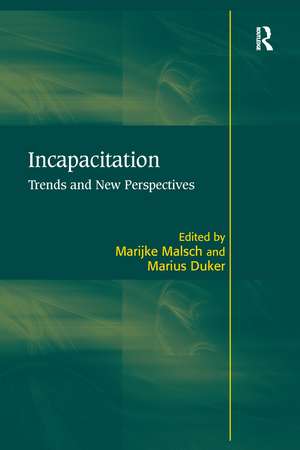Incapacitation: Trends and New Perspectives
Editat de Marijke Malsch, Marius Dukeren Limba Engleză Paperback – 11 oct 2016
| Toate formatele și edițiile | Preț | Express |
|---|---|---|
| Paperback (1) | 486.38 lei 6-8 săpt. | |
| Taylor & Francis – 11 oct 2016 | 486.38 lei 6-8 săpt. | |
| Hardback (1) | 1061.06 lei 6-8 săpt. | |
| Taylor & Francis – 14 noi 2012 | 1061.06 lei 6-8 săpt. |
Preț: 486.38 lei
Nou
Puncte Express: 730
Preț estimativ în valută:
93.10€ • 101.16$ • 78.25£
93.10€ • 101.16$ • 78.25£
Carte tipărită la comandă
Livrare economică 19 aprilie-03 mai
Preluare comenzi: 021 569.72.76
Specificații
ISBN-13: 9781138250642
ISBN-10: 1138250643
Pagini: 276
Dimensiuni: 156 x 234 x 15 mm
Greutate: 0.39 kg
Ediția:1
Editura: Taylor & Francis
Colecția Routledge
Locul publicării:Oxford, United Kingdom
ISBN-10: 1138250643
Pagini: 276
Dimensiuni: 156 x 234 x 15 mm
Greutate: 0.39 kg
Ediția:1
Editura: Taylor & Francis
Colecția Routledge
Locul publicării:Oxford, United Kingdom
Notă biografică
Marijke Malsch (PhD) is a senior researcher at the Netherlands Institute for the Study of Crime and Law Enforcement (NSCR) in Amsterdam, the Netherlands. Her current research focuses on legitimacy of the judicial system, experts in the criminal justice system, stalking legislation in Europe, and lay participation in the criminal justice systems of European countries. Malsch is also working as a honorary judge at the Appeals Court of Den Bosch and the District Court of Haarlem. Marius Duker (PhD) is an associate professor at the Department of Criminal Law and Criminology of VU University in Amsterdam, the Netherlands. His PhD thesis is concerned with the measures adopted in the Netherlands to improve consistent sentencing in criminal law. He worked for six years in Dutch criminal law practice and now his current research focuses on subjects that centre around the criminal law perceived as a means of last resort. Duker is also working as a honorary judge at the District Court of Amsterdam.
Recenzii
A Yankee Book Peddler UK Core Title for 2012 ’The editors and authors of this collection are to be congratulated on a fine work. It is an excellent book that should assume a prominent position in the library of any criminologist, forensic psychologist or psychiatrist, lawyer, social worker or researcher working in environments where incapacitation is employed as a policy tool. Politicians, in particular, could learn much from reading it carefully, reflecting on its contents, and considering the evidence it contains in the development of penal policies.’ Psychiatry, Psychology and Law ’This path-breaking book is brilliantly conceived and flawlessly executed. Each chapter makes a distinctive contribution so that the volume provides a comprehensive analysis of this troubling topic. Although it focuses on the Netherlands, there is enough information about other countries to show that the expansion of incapacitation is a universal phenomenon. There are enough provocative ideas in this book to keep researchers busy for a generation.’ Malcolm M. Feeley, University of California, Berkeley, USA ’Providing a fascinating insight into the changing forms of incapacitation, this volume delineates the spread of what the editors call 'the urge to control and disable'. Blessed with contributions from outstanding scholars, Incapacitation serves not only as an invaluable penological resource, but also to advance thinking about the changing characters of punishment and penal practices.’ Cyrus Tata, Strathclyde University, Scotland
Cuprins
Chapter 1 Introduction, Marijke Malsch, Marius Duker; Chapter 2 Total Incapacitation: The Penal Imaginary and the Rise of an Extreme Penal Rationale in California in the 1970s, Jonathan Simon; Chapter 3 The Incapacitation of the Dangerous Offender: Criminal Policy and Legislation in the Federal Republic of Germany, Hans-Jörg Albrecht; Chapter 4 The Risk of the Persistent Offender and the Special Security Measure, Martin Moerings; Chapter 5 Post-Sentence Incapacitation of Sex-Offenders and the Ethics of Risk Assessment, Bernadette McSherry; Chapter 6 Incapacitation by Pre-Trial Detention, Lonneke Stevens; Chapter 7 Part-Time Incapacitation: Probation Supervision and Electronic Monitoring, Peter H. van der Laan; Chapter 8 Incapacitation: Anti-libidinal Medication in the Treatment of Sex-Offenders, Jelle A. Troelstra, Monique Kossen, Jan R. Niemantsverdriet, Karel Oei; Chapter 9 Circles of Support and Accountability: Combining Prevention and Incapacitation within a Communitarian Approach for Released Sex-Offenders, Bas Vogelvang, Mechtild Höing; Chapter 10 Disqualification from a Profession or an Office: Nature and Actual Practice, Marijke Malsch, Wendy Alberts, Jan de Keijser, Hans Nijboer; Chapter 11 The Application of Administrative Law against Organized Crime: Refusing and Revoking Licenses as Incapacitation, Wim Huisman; Chapter 12 Criminal Records as an Instrument of Incapacitation, Miranda Boone; Chapter 13 Estimating the Effects of Imprisonment: Intended and Unintended Consequences of Incarceration, Arjan A.J. Blokland, Daniel S. Nagin; Chapter 14 Incapacitation: Trends and New Perspectives, Marius Duker, Marijke Malsch;
Descriere
This book discusses the topic of incapacitation from various angles and perspectives. It explores how theories of justice and objectives of punishment are affected by the new emphasis on incapacitation. It also looks at how criminal justice practice is changing as a consequence of this new emphasis. The book presents an overview of these trends, their consequences and alternatives. While a number of cases are focused on the Netherlands, these are placed within the wider comparative and international context. The volume contains contributions from leading experts in the area including: Jonathan Simon, Daniel Nagin and Hans-Jörg Albrecht. .


















